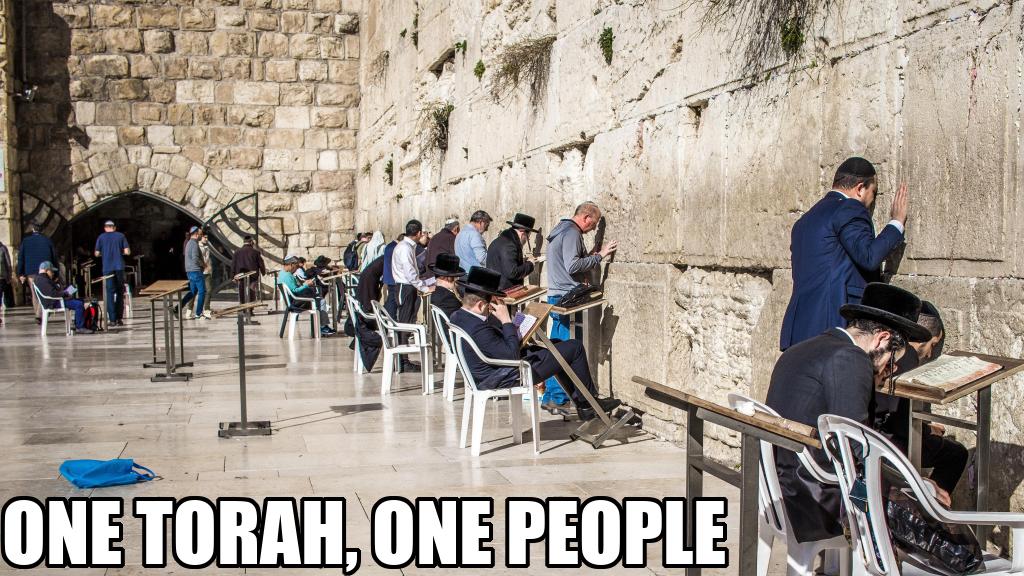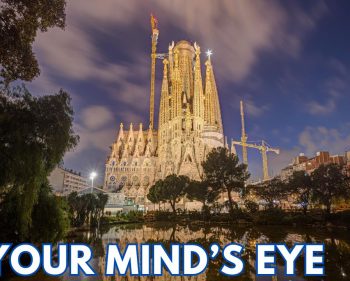ONE TORAH, ONE PEOPLE

It’s hard not to be upset by the divisions tearing apart the Jewish people in Eretz Yisrael right now. We are watching Jew against Jew, brother against brother, people at each other’s throats — all in the name of different priorities and ideals. Each side feels justified, each side certain they are right, and no one is willing to budge. I’m talking, of course, about the epic battle that has once again erupted over the conscription of Haredim into the IDF.
Those who demand conscription accuse the Haredim of shirking their responsibility to defend the Jewish state, while the Haredim indignantly insist that their place is not on the battlefield but in the Beit Midrash, learning Torah. However you look at it, the fact that Torah itself has become the rallying cry for division is heartbreaking. Torah is meant to unite us, not divide us. And that makes a pasuk in Parshat Re’eh all the more remarkable.
The Torah tells us (Deut. 14:1): בָּנִים אַתֶּם לַה׳ אֱלֹקֵיכֶם לֹא תִתְגּדְדוּ – “You are children to Hashem your God; you shall not cut yourselves.”
Rashi explains that because we are God’s children, we are not allowed to disfigure our bodies: ראויין אתם להיות נאים ולא גדודים – “You are children of the King, you should be dignified, not wounded or scarred.”
On the surface, it’s a simple message. If you’re children of the King, don’t go around looking battered and cut up. Carry yourself with dignity. But the pasuk seems to be hinting at something deeper. Why, of all things, does the Torah connect our identity as children of Hashem to the way we treat our physical bodies? Wouldn’t you expect that message to be linked to our souls, which come directly from God?
The Gemara in Niddah (31a) teaches one of the fundamentals of our faith: there are three partners in the creation of a person.
שלשה שותפין יש באדם – אביו מזריע הלובן שממנו גידים ועצמות וצפרנים ומוח שבראשו ולובן שבעין, ואמו מזרעת האודם שממנו עור ובשר ושערות ושחור שבעין, והקב״ה נותן בו רוח ונשמה וקלסתר פנים וראיית עין ושמיעת אוזן ודבור פה והילוך רגלים ודעת ובינה והשכל.
“The father contributes the white substance, from which come bones, sinews, nails, the brain, and the white of the eye. The mother contributes the red substance, from which come skin, flesh, blood, hair, and the black of the eye. And God provides the spirit, the soul, the facial features, eyesight, hearing, the ability to speak, to walk, knowledge, understanding, and wisdom.”
So the partnership is clear: parents provide the body, and God provides the soul. Which brings us right back to our question: if the soul is God’s contribution, why does the Torah call us His children in the context of protecting the body? Wouldn’t it make much more sense for the Torah to link “children of God” to our souls — to that part of us that He gives us?
This whole topic becomes even more curious when we realize that the phrase לא תתגודדו shows up in a completely different context elsewhere in the Gemara. In Yevamot (13b) the Gemara derives another prohibition from these very words. It says: לא תעשו אגודות אגודות – “Do not form factions.”
In other words, you shouldn’t have two different batei din in the same city, one following Beit Shammai and the other following Beit Hillel. The community mustn’t splinter into competing sects.
So it’s the same phrase, but in one place it’s telling us not to cut the body and make it ugly, and in another place it’s telling us not to cut the community into rival groups.
As we know, the Torah doesn’t waste words. It’s not just a coincidence that the same expression is used for two such different ideas. Clearly, there must be a deeper connection — a single theme that ties both of these prohibitions together.
The key lies in how the Torah defines what it means to be a “child.” In the Shema we are commanded (Deut. 6:7): וְשִׁנַּנְתָּם לְבָנֶיךָ – “You shall teach them to your children.” Rashi explains: לבניך – אלו התלמידים – “your children” really means your students.
And to prove this, he brings our very pasuk in Re’eh: בנים אתם לה׳ אלקיכם – “You are children to Hashem your God.” Just as our students are called our children, so too when we learn Torah from Hashem, we are called His children.
And this idea is driven home even more strongly in the Mishnah in Bava Metzia (33a): אבידת רבו ואבידת אביו – אבידת רבו קודמת לאביו, שאביו הביאו לחיי העולם הזה ורבו שלמדו חכמה מביאו לחיי העולם הבא.
“If one’s father and one’s teacher have both lost something, one must return his teacher’s lost object before his father’s – for his father brought him into this world, but his teacher, who taught him Torah, brings him to eternal life in the World to Come.”
So here’s the picture: the father gives you your body, but the teacher gives you eternity. But there’s something even more subtle here. Torah doesn’t only grant eternity to the soul; it also elevates the body. The body that might seem just physical, material, finite — Torah lifts it into a higher plane. Through Torah, body and soul together are revealed as divine, and both become part of eternity.
And that’s exactly why the Torah links these two prohibitions together. First of all, you have to remember that you are a child of Hashem in both body and soul. Through Torah learning, even the physical part of us becomes divine. To cut the body is to deny that holiness lives there.
But then comes the second part. If Torah — which is supposed to unite us — ends up splintering the community into rival factions, then in a way you’re saying the Torah isn’t one, that it doesn’t come from the One God, and that it doesn’t have the power to bind us together.
And this is what makes our current situation in Eretz Yisrael so heartbreaking. Torah, which should be the great unifier — binding the body of the Jewish people together — is instead being invoked as the justification for division.
On one side, Jews risk their lives on the battlefield to defend our homeland with their bodies.
On the other side, Jews insist that their place is in the Beit Midrash, and that their Torah learning exempts them from sharing that burden.
Both camps are utterly convinced they are right. But how can it make sense for אגודות אגודות — rival factions — to proliferate, for dissension to spread like wildfire, and for us still to imagine that we can stand as בנים אתם לה׳ אלקיכם, children of Hashem worthy of His protection? The bitterness and anger that have erupted do not just fray at the fabric of Jewish unity — they endanger the very life of every Jew.
When Torah itself becomes the wedge that drives us apart, when לא תתגודדו is flipped on its head and Torah is twisted into the excuse to form אגודות אגודות, then the very purpose of Torah has been betrayed. The Torah was given to unite body and soul, and to unite one people under one God. And until we reclaim it in that spirit, we will not truly be able to call ourselves His children.
We must send out a message loud and clear: a Jewish people without Torah is not safe, but a Jewish people where Torah is turned into a weapon of division is most definitely not safe. Torah is what binds body and soul, father and teacher, community and individual, into one whole. It was never meant to be the source of strife.
When the Torah tells us בנים אתם לה׳ אלקיכם – לא תתגודדו, it is reminding us that as Hashem’s children we are one body. And just as we are forbidden to cut up that body, we are forbidden to cut up our people. If Torah becomes the instrument of division, then we have missed the entire point.
Our challenge, especially in these painful days, is to make sure that Torah remains what it was always meant to be — the divine gift that unites the Jewish people, body and soul, as one. And if we can hold onto that truth, then perhaps we will finally be worthy of being called Banim l’Hashem Elokeinu — God’s children, together.

